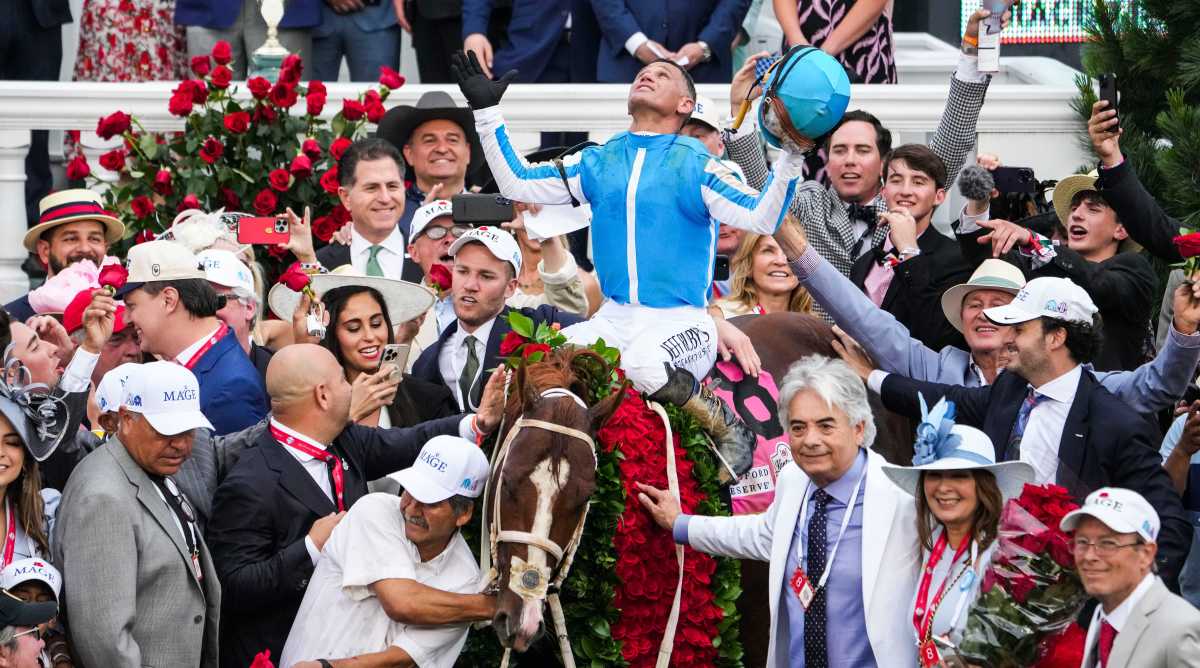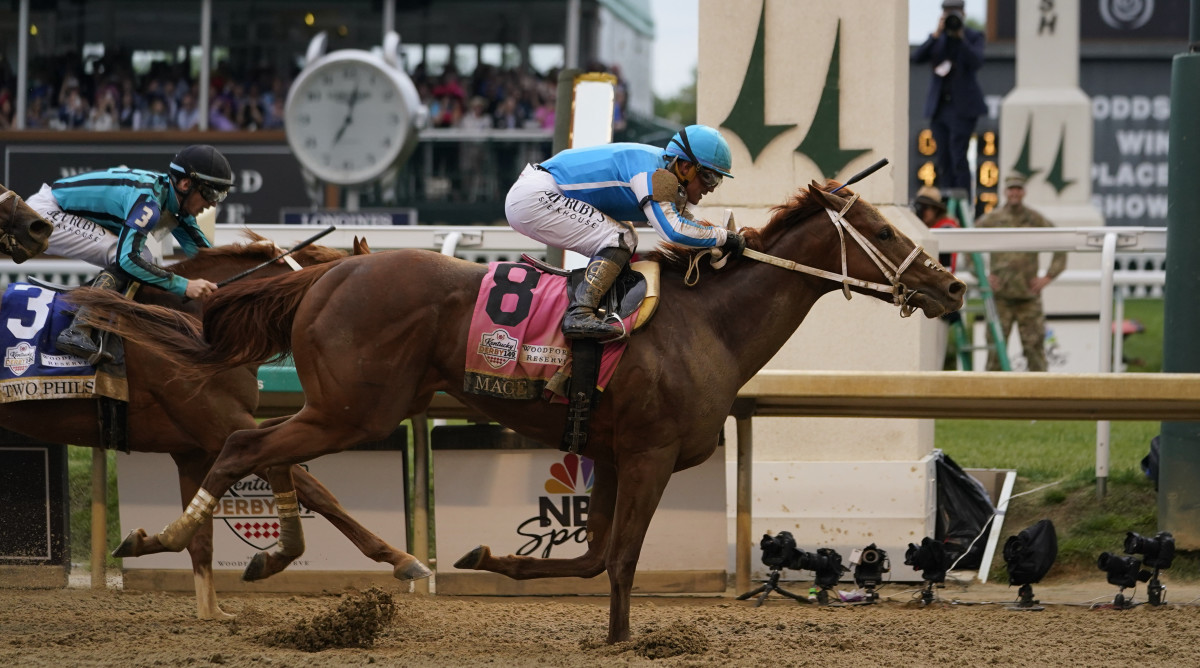Mage’s Kentucky Derby Victory Provides Thrilling End to Tragic Week at Churchill Downs

LOUISVILLE, Ky. — The show always goes on in horse racing. Sometimes callously, sometimes with a degree of tone deafness, sometimes with an avert-your-gaze denial of the sport’s tragic truths.
It went on at Churchill Downs again Saturday. The day began with the scratch of Kentucky Derby favorite Forte due to state veterinary concerns, the fifth Derby scratch of the week, most since 1936. Then there were two more horses euthanized after being injured in undercard races, bringing the number of equine deaths at the track to seven since April 27. But the Derby stops for no one and nothing, and so they sprung open the starting gate just past 7 p.m. and ran this race for the 149th time, and once again it produced the scenes and emotions that make the event so beguiling.
In the end, after lightly raced Mage completed a long comeback by thundering down the stretch to win the Derby at 15-1 odds, the show was so compelling that it was almost—almost—as if nothing bad had happened.

There was a Venezuelan expatriate trainer with white hair in a white suit walking triumphantly toward the winner’s circle as jubilant countrymen behind him waved that nation’s flag and chanted his name: “Gu-sta-vo! Gu-sta-vo! Gu-sta-vo!” For Gustavo Delgado Sr. and his son, Gustavo Jr., this was the moment they set their sights on when they moved their racing operation to America eight years ago.
There was a Venezuela-born jockey who earlier in the day in the Churchill Downs jockeys’ room saw an NBC segment that mentioned his 0-for-15 Derby record, and viewed it as “inspiration.” Javier Castellano told himself, “This is going to be the year. I’m going to do it.” Then he went out and patiently guided Mage from near-last place after missing the break into striking range on the far turn, then unleashed the winning stretch run.
There was primary owner Ramiro Restrepo, who pulled together four groups of investors to fund the $290,000 purchase price of Mage and gave the colt his name (“Magician,” in French), in tears after hugging Gustavo Jr. “It’s one heck of a melting pot,” Restrepo said of the horse’s wide web of connections.
Among the smaller-share owners, there was a man walking in a blissful daze to the winner’s circle. Damon Stinson went to elementary school at Holy Name Parish, which he could see from where he stood—the church is just a few hundred yards from where the Derby starting gate opened. Stinson grew up around Churchill and attended his first Derby at age 8, hanging around the barn area that day, but now lives in Miami and hooked in with a group of microshare Mage owners. “Look where I’m standing right now,” he said, disbelief in his voice. Fittingly for a guy who grew up in the working-class track neighborhood, his post-Derby dinner was going to be at the same place it always is: Kingfish restaurant, where the fried seafood platter will set you back $25.99.
The thrill of sudden victory in a two-minute sporting event at fairly long odds—Mage was the eighth betting choice in the 18-horse field—is plenty captivating. But it’s also impossible to view the Derby in a vacuum when so many bad things happened in the lead-up to racing’s signature moment. Thoroughbred injuries are the sport’s hard truth, and rarely has that truth been more public than in the past 10 days.
These particular equine deaths were a hodgepodge of calamities more than a single, easily identifiable problem. There were four fatal leg injuries on the dirt track—three sustained in races and one during morning training. There was a fatal leg injury on the turf course. Castellano, who rode multiple races at Churchill this weekend on both the grass and the dirt, said the racing surface was not to blame.
“Things happen in races,” he said. “Unfortunately, this weekend, a lot of horses were gone. But nothing to do with the track. I think the track is in great condition.”
There was a horse who reared and flipped himself on opening night of the spring meet, on April 29. There were a pair of sudden collapses after races, both Saffie Joseph trainees.
Those deaths were sufficiently strange and unexplained that the Kentucky Racing Commission scratched the rest of Joseph’s horses for the week, including his Derby entrant, Lord Miles. A sport with an ugly history of drug and medication abuse creates its own suspicion, especially in situations like this one. Churchill followed by suspending Joseph, part of a continued hard line taken by the track in dealing with horsemen in recent years.
Churchill famously suspended superstar trainer Bob Baffert for two years after his seventh Derby winner, Medina Spirit, tested positive for an overage of medication that is impermissible on race day. The legal battle that ensued has been spirited, but Churchill won and the suspension stood.
The track’s stance was clear: nobody is bigger than the Kentucky Derby. That same thinking probably applied to Joseph’s suspension, and it likely has played into some of the vet scratches in big races—Forte’s most of all.
The horse stumbled slightly after a misstep during training Thursday, and the Churchill barn area was rife with speculation for the next two days that Forte would not make it into the starting gate. Come Saturday morning, all eyes were watching his one-mile gallop. It appeared to be uneventful, but state vet Nick Smith scratched Forte around 9 a.m., just 10 hours before the race.
Smith had a discussion with trainer Todd Pletcher and an animated owner, Mike Repole, before the scratch was announced. Repole said Smith told him Forte was “a tick off” in his right front leg, and that was enough to earn a scratch. Nobody is bigger than the Kentucky Derby, even the race favorite, and a vet who is known as “really picky” according to one horseman reinforced that.
Smith declined comment after the decision, and nobody else stepped up to offer an explanation. That was a pitiful lack of transparency that didn’t serve anyone well, and is part of the sport’s failure to be as accountable as it needs to be.

The truth is this: who wins this race is almost immaterial to Churchill Downs. The most important thing to the host track is sustaining the scope, grandeur, tradition—and revenue—of America’s most famous horse race. The biggest threat to the Derby as an institution is catastrophic injury, and nobody in a decision-making capacity wanted even a slight risk associated with Forte to manifest itself as a tragic breakdown on national television.
Churchill and the Kentucky racing commission deserve credit for taking a hard-line cautious stance. Whether that’s rooted in pure concern for the animals or as a protective approach to its massive money-making day, decide for yourselves.
The Derby survived one horrific breakdown, in 2008. Filly Eight Belles broke down on the backstretch after running through the finish line and around the turn, which was enough to turn some off from horse racing for good. But the race and the sport have powered through, and the Derby’s largely fate-kissed existence has continued.
Until this year. The bad news came in waves, to the point that longtime racing journalist Ron Flatter declared Thursday morning in the Churchill barn area, “It feels like we’re sitting on a powder keg.”
Forte’s scratch and the two deaths—Chloe’s Dream after the second race and Freezing Point after the eighth—could be considered an explosion of bad news. But the sport has a way of surviving bomb blasts of its own making.
“It's a very difficult subject, especially in the climate of 2023,” Restrepo said. “We are very sensitive to these unfortunate instances. All I can say is, we do our best to take care of our horses. We treat them better than we treat our children. And we had full confidence in the soundness of our horse. He's been training here for two weeks and actually has been flourishing over this racetrack.”
The final plot twist in a jarring week was this: the one horse Mage hasn’t been able to beat this year is Forte. He finished fourth in the Fountain of Youth stakes in March as Forte powered off to a 4 1/2-length victory. Then he was second to Forte in the Florida Derby April 1, the final Derby prep race for both horses.
Maybe this would have been the race where Mage—who had just three career starts before Saturday—matured and turned the tables on Forte. But you know it had to twist the knife in the guts of Repole and Pletcher to see a horse they’d beaten twice win the roses, while their colt was scratched in what could be considered a borderline call.
But after the week that racing put itself through, the only proper choice was to err on the side of caution. Even extreme caution. Because it would be much better if thoroughbred racing’s biggest show could go on with fewer bad stories in the future.
